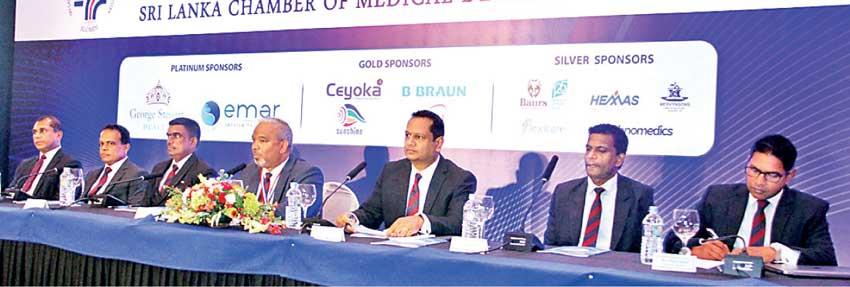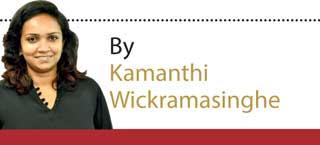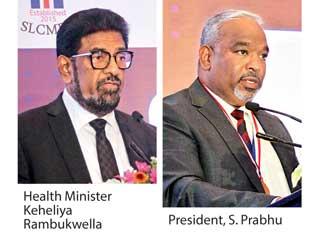Reply To:
Name - Reply Comment

Pics by Pradeep Dilrukshana
 At a time when the country is gasping for breath in the face of an economic crisis, several industries are determined to support the economy amidst facing their own challenges. The Sri Lanka Chamber of Medical Devices Industry (SLCMDI) is the only legislative body that represents the medical devices fraternity in the island which includes membership of 72 leading importers. However, Sri Lanka has less than one medical device manufacturer against 15 pharma manufacturers and industry specialists believe that the medical devices industry could do much more to boost the Sri Lankan economy, especially on the lines of medical tourism.
At a time when the country is gasping for breath in the face of an economic crisis, several industries are determined to support the economy amidst facing their own challenges. The Sri Lanka Chamber of Medical Devices Industry (SLCMDI) is the only legislative body that represents the medical devices fraternity in the island which includes membership of 72 leading importers. However, Sri Lanka has less than one medical device manufacturer against 15 pharma manufacturers and industry specialists believe that the medical devices industry could do much more to boost the Sri Lankan economy, especially on the lines of medical tourism.
During the recently concluded annual general meeting for 2022/2023, S. Prabhu was re-elected as President. In his speech, Prabhu stressed the fact that access to good quality, affordable and appropriate healthcare products is indispensable to advance universal health coverage, address health emergencies and promote healthier populations. “Today there are more than two million medical devices in the world market in over 7,000 categories,” he said.
 A medical device can be any instrument, appliance, implant, reagent for in-vitro use, software, material or other similar related article intended by the manufacturer to be used alone or in combination for a medical purpose, for prevention, screening and in palliative care. “Such health technologies are used to diagnose illness, monitor treatments and assist disabled people and intervene and treat acute and chronic illnesses. The masks, PCR swabs, syringes, PCR tests, machines, oxygen regulators, ventilators, ICU beds used during the pandemic are recent examples.”
A medical device can be any instrument, appliance, implant, reagent for in-vitro use, software, material or other similar related article intended by the manufacturer to be used alone or in combination for a medical purpose, for prevention, screening and in palliative care. “Such health technologies are used to diagnose illness, monitor treatments and assist disabled people and intervene and treat acute and chronic illnesses. The masks, PCR swabs, syringes, PCR tests, machines, oxygen regulators, ventilators, ICU beds used during the pandemic are recent examples.”
A medical device is key to the diagnosis in order to start treatment. “A wrong reading or a wrong report could lead to adverse treatments which could be fatal. It demands for careful assessment of the product to be registered and marketed in the country. Securing and possessing the skills on latest medical devices and technologies will be an advantage to the medical professional, the hospital and also the country. Technologically-advanced healthcare systems can attract foreign exchange to countries like ours with medical tourism. People travel across borders for medical procedures, treatments and for cosmetic surgeries as well. Our healthcare system is one of the best in the region and our medical professionals have travelled overseas and have been trained with technologically-advanced surgical devices and medical equipment. We have well-advanced government and private hospitals across the country. If we can leverage and promote the country for medical tourism we all can be a contributor to the national economy. People travel to Singapore, Thailand, India and Turkey for surgical and plastic surgery procedures. A rise in medical tourism is seen in the Maldives where the family takes a holiday while the patient is doing dialysis in Male. So why not in Sri Lanka?” he questioned.
While the medical devices industry is willing to make available the required technology and products, Prabhu suggests that advanced devices require faster registration procedures. Regulating procedures are said to be essential in order to protect the industry and gain credibility. “With medical devices advancing rapidly on technology with different models, we will need to accommodate these changes. Compared to pharmaceuticals the lifecycle of a medical device is very short and unless we adapt to rapidly changing advanced technology the product will become obsolete soon,” he said while adding that stakeholders such as the National Medicines Regulatory Authority have ascertained to ease registration procedures and fast-track the registration process.
“We have more than 15 pharma manufacturers in this country but less than two device manufacturers,” he continued. “Medical devices are part of the healthcare industry. Pharmaceuticals are exempted from the 2.5% social security contribution levy but our industry will be taxed 2.5% on the turnover from October 1. We do know that there had been a genuine mistake of taxing the devices which is part of the healthcare provider. Taxes are a further burden to the industry and increase costs to the patients. But while the IMF is discussing about removing subsidies, it won’t be easy with finance policymakers to request to reverse.”
Prabhu reiterated the fact that around 100 medical devices registered at the NMRA are VAT charged. “A 15% VAT is charged on price regulated glucose strips used by patients. The price increase does not cover the VAT increase and thus the industry is facing issues to import and serve the market. We appreciate the price increase to cover the exchange loss but we are still 7% less. According to the formula, the dollar has swapped out to Rs. 350 but we are importing at Rs. 365. If the bankers can maintain the dollar at 350 the whole country can benefit. In April, the price increase was granted for pharmaceuticals and only in the month of August, the prices were increased in the four medical devices. Therefore price increases should be done on pharmaceuticals and devices at the same time. Having dedicated tender guidelines at SPC for medical devices is a setback for our industry. We have been discussing these for more than four years and we haven’t seen any progress to date.”
We have well-advanced government and private hospitals across the country. If we can leverage and promote the country for medical tourism we all can be a contributor to the national economy
He concluded his speech by requesting decision-making authorities to exempt the industry of certain levies and taxes and to settle the exchange loss in order to sustain the business.
In his comments, Health Minister Keheliya Rambukwella said that he is aware of the issues raised by the medical devices industry such as that of the registration of medical devices. “In the past, the main issue pertained to the limitations of understanding of the subject. Currently, we have begun streamlining the process at the NMRA and I’m confident that our frequent interaction will pave the way for a rapid and efficient registration process. It is crucial that we work together to provide our patients with the best healthcare. I’m also aware of the repeated appeals made to the ministry regarding the lack of a formal procedure for the pricing of medical devices. I intend to work with all stakeholders to find a workable solution that is favourable to all with minimum burden to the end user, the patient.”
He further said that health/medical tourism could benefit the country in the long run while acknowledging the expertise of healthcare professionals. He said that the country should make maximum use of the medical devices, medical equipment, pharmaceuticals and professionals while requesting the industry to assist the government to overcome its challenges at present.